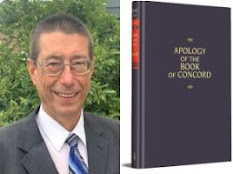So, on the one hand, we have seen that Melanchthon, from the year 1535 on, until Luther's death, was, however, at times tormented by doubts and wavered in his previous convictions, but on the other hand, that he, no less, until Luther's death, on the most diverse occasions, publicly confessed Luther's doctrines without reservation, and that, therefore, Luther, until his death (with short interruptions), expected the best of Melanchthon's faith and teachings, and that Melanchthon himself continuously expressed the conviction that he was not at all aiming to bring up new dogmas and to correct Luther, (LuW 338), but that his intention was to present the existing doctrine only for the benefit and piety of the young students, without all paradoxical and therefore misunderstandable expressions, actually, clearly and in a method convenient for teaching. Of course, we have also seen that Melanchthon, behind Luther's back, complained bitterly about Luther, especially about Luther's fiery zeal against all false doctrine, or rather against false sacramental doctrine, even to the sacramentarians; indeed, in order to establish an external peace, he not infrequently resorted to ambiguous words and formulas and sometimes showed himself willing to make the most dangerous concessions to the opponents themselves; but until Luther's death he never publicly declared himself either against Luther's doctrines or for the doctrines of his opponents.
Taken together, this casts a very bad light on Melanchthon and his behavior in the time since which the first scruples concerning Luther's doctrines may have arisen in him, until Luther's death. But far from it appearing that Luther carried Melanchthon as a false teacher who was seen through by him, it only falls on Melanchthon the appearance that he, if he had really inwardly apostatized from the truth, knew how to maintain in Luther the good opinion that he still stood with him in full doctrinal unity. We must not forget two things here, firstly, what is now, after all documents have been brought to light, as clear as daylight, mostly hidden from Luther and hardly suspected by him; secondly, that Melanchthon, as a result of his unmeasured love of peace, accommodated himself not only to the Swiss but also to Luther in every possible way, therefore Luther did not carry him as a false teacher, but recognized him bona fide as a weak, slightly wavering, but nevertheless pure teacher.
Therefore, Löscher rightly calls Hospinian's and other Reformed accounts of the matter, as if Luther had known of Melanchthon's apostasy, but had indulged him in it, "novelistic" [einen Roman, i.e. imaginary]. (Hist. mot. II, 34)
Our opponents will now admittedly say that it is unthinkable that Luther should not have noticed anything of the deviations of which Melanchthon was notoriously guilty in his doctrines even during Luther's lifetime. [And a concern of mine.] However, as little as this can be denied by anyone familiar with the history of the Reformation, it is also an undeniable fact that Luther, far from simply overlooking it and carrying it of Melanchthon, whenever he noticed something of it, rather immediately took action against it.
(Conclusion follows)
Friedrich Bente wrote about this Apology:Alongside the Formula of Concord, there is no other book of that period in which the pure doctrine of the Lord’s Supper, the person of Christ, and original sin, along with related doctrines, is presented so clearly and convincingly and defended against the objections of the false teachers. (Friedrich Bente, “Die Apologie der Concordienformel,” Lehre und Wehre 48 (1902): 229)


.jpg)

No comments:
Post a Comment
Comments only accepted when directly related to the post.